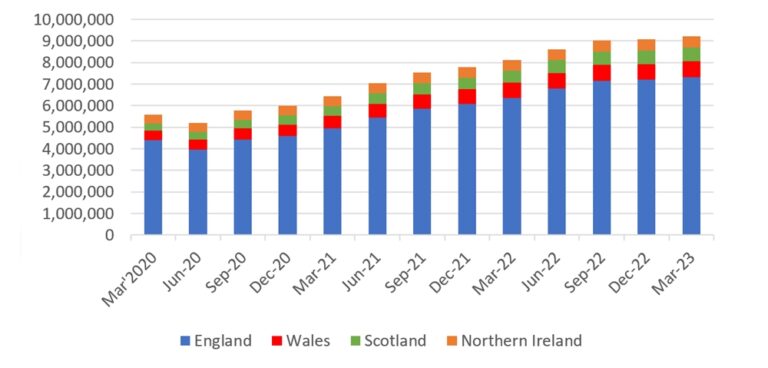Analysis of English and devolved government data on the NHS crisis from leading independent consultancy Broadstone shows that UK waiting listings have grown by 3.6 million since the start of the pandemic – an increase of 65%.
As at March 2023 – the latest up-to-date figures available across all four nations – 9.2 million are now waiting for treatment. It is a number that has risen from 5.6 million just before the pandemic, and by 1.1 million over the past year as the public health system struggles to cope with demand.
England accounts for the lions’ share of the list, with English patients representing 79.6% (7.33 million) of the total1.
The three devolved nations have all seen waiting lists rise significantly, with Wales2 accounting for 8.0%, Scotland3 6.8% and Northern Ireland4 5.7% of the total UK backlog.
Brett Hill, Head of Health & Protection at Broadstone, said: “We have all read with growing concern the reports of our deteriorating public health system coming out of the four home nations. This analysis looks to bring together the data on a UK-wide level to provide a true picture of the crisis facing the NHS across the United Kingdom.
“Taken together, the picture is bleak. Many millions have joined a huge waiting list for treatment since the pandemic and the numbers are still rising despite national and devolved governments pledging to reduce the backlog.”
The analysis comes amid continued growth in economic inactivity because of long-term sickness.
The latest statistics5 show that 99,000 more people have become economically inactive in the UK due to ill-health in the six months to 2023. It takes the total number to 2.6 million – a surge of over 427,000 people since the pandemic compared to the 2.12 million as at January-March 2020.
Meanwhile the latest PHIN data6 shows that the total number of private healthcare admission in 2022 was the highest since records began at 820,000, up 5% on pre-pandemic levels.
The knock-on impact of a struggling public health system is now being felt by businesses throughout the UK, according to Mr Hill. “The problems in the health service cannot be taken in isolation,” he said. “They have a tangible impact in people’s everyday lives, including their professional careers.
“Businesses are now starting to recognise the need to invest in the health and wellbeing of their staff to avoid the problems that economic inactivity due to sickness causes them, especially in such a tight labour market.
“The ability to support workers with private healthcare options, for example, means that employers can keep their staff fit, healthy and productive while avoiding absenteeism. Given the pressures in the NHS seem unlikely to abate in the near-term we expect to see further demand for private health options through the rest of 2023 and beyond.”

